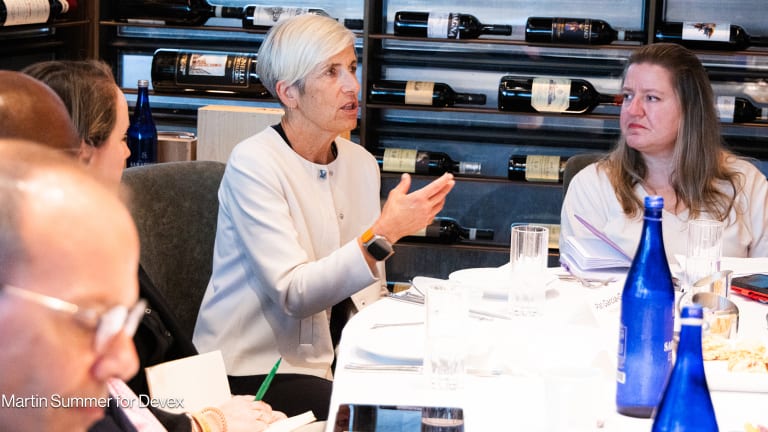Ways you can work on smart city development
While technology plays a major role in providing smart solutions, a wide range of skilled and innovative professionals are critical to achieving safe, inclusive, resilient and sustainable cities. Here is an overview of some of the ways to work in today’s smart cities.
As people around the world continue to migrate to cities in search of jobs and opportunities, developing smarter and more sustainable cities is key to tackling the poverty and inequality that can occur in these urban environments. It is estimated that by 2050, some two-thirds of the world’s population will live in cities. Smart design and solutions are needed to ensure these are safe, inclusive, resilient and sustainable for the communities. A smart cities approach can help achieve this and improve living standards for citizens through the provision of adequate housing and services, access to sustainable transport and green energy, among other things. While innovative technologies play a huge part in offering smart solutions, designing and maintaining truly smart cities is not possible without the contribution of skilled and talented professionals from a wide range of backgrounds. Here is an overview of just some of the ways to work in today’s smart cities. Research roles to inform decisions Research is fundamental to building smart cities — whether it’s talking to citizens about access to green public spaces or investigating the need for better waste management systems. Researchers are essential to identify problems and provide insight and data to inform decisions and shape solutions. Analysis of different approaches and practices is also critical to ensure the future application of the most effective and sustainable approaches. Researches tend to dive deep into a specialty — for example in urban water conservation — to produce literature reviews, desk reports and case studies. Research is also key to community participation and allowing citizens to voice their opinions. Christel Augsburg, who has experience consulting in smart cities and sustainability, believes research professionals will increasingly be in demand because, in a lot of cases, cities are still creating solutions without knowing if the citizens even want them. “There is a need for more researchers and sociologists behind the thinking, anthropologists too, just people who are used to connecting information and turning those into actionable items — people with a research-oriented background,” she added. All things data Data is the big buzz word and a high-value commodity across all sectors involved in smart city development. Professionals skilled in data science and analytics are therefore in high demand. Lisa Smyth, a specialist in urban resilience who works with global development organizations, wants to see investment in this area to allow for more open and verified data, which “can be incredibly inclusive in the right hands.” Joan Torres, who is co-founder of LABCITIES and has a background in software engineering, explained that since connectivity and data are essential components of smart cities, the expansion of big data and the “internet of things” technologies will continue to play an important role in achieving smart city initiatives. “Big data analytics offers the potential for cities to obtain valuable insights from a large amount of data collected through various sources, and the IoT allows the integration of sensors in the real-world environment, allowing us to monitor and control essential urban elements such as traffic lights, parking meters, energy consumption, pollution levels, etc. So there is a high demand for skilled tech professionals to make all this happen,” says Torres. Jobs in tech From government administration to transportation to health care, there are a lot of ways tech-savvy professionals can work in today’s smart cities. Each area may require a different set of skills and expertise, explained Torres. This is particularly the case, he added, when it comes to hardware and infrastructure development. “There is usually a group of professionals related to software development, which are generally demanded across all domains: software engineers/architects, programmers, user experience designers, database administrators, data scientists, software testers, system administrators, security experts, etc.” While experience in software programming or system development may be essential for IT and database platforms, a knowledge of specific systems relating to development projects such as urban water management is useful for working on smart solutions. Professionals in system and network integration also play a vital role in the flow of information in smart cities development. The need for professionals from tech backgrounds will continue to grown. According to Alicia Asín, CEO of Libelium, any smart city project involves a great range of professionals “but indeed, electronic engineers and IoT developers will be the most in demand in the future to make reality the perspectives that say there will be 50 billion devices connected in the following three years. Who is going to program all these devices?” she asks. Asín also predicts that the fast-paced evolution of technology and the importance of device compatibility will require experts such as software and hardware developers, technology architect managers, system engineers and cloud platform software engineers. Engineers Along with urban planners, civil engineers concentrate on the use of the physical space and infrastructures within a city. They work on everything from public transport infrastructure to designing water supply and waste management systems. Mechanical engineers also contribute to smart cities through designing and building machine-driven products involved in data collection and creating innovative solutions to simple problems such as refuse collection. Having worked in project management in several cities, Augsburg spoke of a need, for engineers to adapt their approaches for work in smart cities and for more efficient processes. “There’s a lot of software engineers and engineers in general that you need but there’s a really big gap between engineers understanding what’s actually going on in the city operations and another thing is that there is huge gap within departments in the city so it’s very fragmented.” Urban planning to build resilient communities An urban planner develops strategies and programs for the use of land. Urban planners work to create communities, plan and adapt for growth, or revive physical features and infrastructures in cities. A master’s in urban planning is a requirement of most jobs in urban development or consultancy assignments working on sustainable solutions for cities. In the context of smart cities, the focus on creating communities and ownership through planning is particularly important. Abbas Sbeity, founder of Architects for Change, studied architecture before becoming involved in urban planning to create smart and inclusive cities, taking a participatory approach to his work. He has contributed to the design and upgrade of spaces in urban areas of Beirut, which has witnessed high levels of immigration. He believes architecture should bring people together and the planning process should be democratic. “We also focus a lot on participation as one of main pillars of smart cities is to be inclusive. We use participatory approach, which is one of the design approaches, and we use that in our projects and that is a tool to design and be architects that facilitate design process, rather than impose changes to communities. What we do is we actually work with communities,” he added. Developing smart cities also involves building cities that are less vulnerable to disasters and addresses issues surrounding urban climate change resiliency. Smyth, who also hails from a background in architecture, first started working in urban planning during the reconstruction of Haiti after the 2010 earthquake. She believes resilience is a major component of urban planning and is about “trying to find ways to identify people who are vulnerable in the city and make sure they are not building in areas where they could lose their lives if and when a disaster happens.” Check out the Devex job board for more positions working in urban planning and smart cities development, or leave us a comment below to tell us the ways you work in today’s smart cities. Over six weeks, Devex and our partners will explore what it takes to build a successful smart city, how climate resilient and environmentally friendly infrastructure and technologies are being implemented, and how actors in the global development community are working together toward common goals and engaging local communities in an inclusive way. Visit the campaign site and join us as we examine what it takes to create our smart cities of the future by tagging #SmartCities and @Devex.
As people around the world continue to migrate to cities in search of jobs and opportunities, developing smarter and more sustainable cities is key to tackling the poverty and inequality that can occur in these urban environments. It is estimated that by 2050, some two-thirds of the world’s population will live in cities. Smart design and solutions are needed to ensure these are safe, inclusive, resilient and sustainable for the communities.
A smart cities approach can help achieve this and improve living standards for citizens through the provision of adequate housing and services, access to sustainable transport and green energy, among other things. While innovative technologies play a huge part in offering smart solutions, designing and maintaining truly smart cities is not possible without the contribution of skilled and talented professionals from a wide range of backgrounds. Here is an overview of just some of the ways to work in today’s smart cities.
Research is fundamental to building smart cities — whether it’s talking to citizens about access to green public spaces or investigating the need for better waste management systems. Researchers are essential to identify problems and provide insight and data to inform decisions and shape solutions. Analysis of different approaches and practices is also critical to ensure the future application of the most effective and sustainable approaches. Researches tend to dive deep into a specialty — for example in urban water conservation — to produce literature reviews, desk reports and case studies.
This article is exclusively for Career Account members.
Unlock this article now with a 15-day free trial of a Devex Career Account. With a Career Account subscription you will get:
- Full access to our jobs board, including over 1,000 exclusive jobs
- Your Devex profile highlighted in recruiter search results
- Connections to recruiters and industry experts through online and live Devex events
Start my 15-day free trialAlready a user?
Printing articles to share with others is a breach of our terms and conditions and copyright policy. Please use the sharing options on the left side of the article. Devex Pro members may share up to 10 articles per month using the Pro share tool ( ).
For four years, Emma Smith covered careers and recruitment, among other topics, for Devex. She now freelances for Devex and has a special interest in mental health, immigration, and sexual and reproductive health. She holds a degree in journalism from Glasgow Caledonian University and a master’s in media and international conflict.








